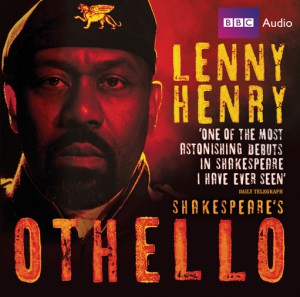2010. GB. CD. 135 minutes (on 2 discs). BBC Audio. ISBN: 978-1408466919. Price: £12.99
 About the author: Dr Deana Rankin is Lecturer in English and Drama at Royal Holloway, University of London and author of Between Spenser and Swift: English Writing in Seventeenth-Century Ireland (CUP, 2009)
E-mail: Deana.Rankin@rhul.ac.uk
About the author: Dr Deana Rankin is Lecturer in English and Drama at Royal Holloway, University of London and author of Between Spenser and Swift: English Writing in Seventeenth-Century Ireland (CUP, 2009)
E-mail: Deana.Rankin@rhul.ac.uk
 This CD looks very different from others in the BBC Audio Shakespeare series. No synopsis booklet, no scene-by-scene breakdown, in fact very little mention of Shakespeare at all: on the BBC shop website it is listed as ‘Lenny Henry’s Othello’. From the cover, Henry gazes out, a tragic Fidel Castro; the notes inside describe ‘Lenny Henry’s Road to Othello’, an at times rather patronising account of just how far the BBC enabled that journey. All the signs are that this is more celebrity than Shakespeare.
This CD looks very different from others in the BBC Audio Shakespeare series. No synopsis booklet, no scene-by-scene breakdown, in fact very little mention of Shakespeare at all: on the BBC shop website it is listed as ‘Lenny Henry’s Othello’. From the cover, Henry gazes out, a tragic Fidel Castro; the notes inside describe ‘Lenny Henry’s Road to Othello’, an at times rather patronising account of just how far the BBC enabled that journey. All the signs are that this is more celebrity than Shakespeare.
Put the CD in the player however, take a little time to cast off the residue of Henry’s ubiquitous comic voices, and this makes for excellent Shakespeare listening. Directed by Barrie Rutter of Northern Broadsides, this version of Othello opened at the West Yorkshire Playhouse in February 2009, later transferred to the Trafalgar Studios, London and earned Lenny Henry ‘Best Newcomer’ in the Evening Standard Theatre Awards that year. The recording is of the full cast production broadcast on BBC Radio 4 in February 2010.
... this makes for excellent Shakespeare listening
It might seem rather perverse to listen to a play which revolves on stage around questions of what you see, or rather, what you think you see: Othello’s blackness; Cassio greeting the newly arrived Desdemona just a little too enthusiastically; the lost handkerchief which turns up in the wrong hands. But ‘just’ listening to Othello is – even for those who think they know the play well – a revelation. Shakespeare’s text, with its fierce and uncompromising language of colour and violence – of black, white and red - is here firmly in the spotlight. The production does not always strike the right chord: the military background is rather unconvincing and the barracks of Cypress are more Glee Club than barely contained brawling. But the pace of the production is appropriately relentless with Othello’s tragic demise from well-spoken diplomat to calculating killer hurtling brutally along. The voice of Iago (Conrad Nelson) dominates as he repeatedly backs his listener into a corner, whispers in your ear, forces you into reluctant complicity with his schemes. His final vow of silence, ‘Demand me nothing; what you know you know: From this time forth I never will speak word’, is all the more resonant.
Listening against the background of contemporary British politics, as the former insults of election enemies evolve into a fluent language of coalition, one is reminded of the vast range demanded by the part of Othello, the bloody soldier who tries, not just to turn politician, but also to turn husband. Henry seems least at ease when Othello defends his wooing of Desdemona to the assembled Venetian senators; he cannot quite match the articulate, impassioned statesman which James Earl Jones delivers when - in another moment of recent electoral resonance – he performed the same speech for the Obama family at the Whitehouse (http://tinyurl.com/yj57bhf). Rather it is as ‘honest Iago’ gnaws away at his few certainties that Henry hits his stride, culminating in his long low growl of rage as Othello prowls around the sleeping Desdemona. His ‘Put out the light and then put out the light’ leaves us in no doubt that, however much his final eloquent suicide will seek to present it otherwise, this is brutal premeditated murder.
‘Just’ listening also brings new attention to the female voices of Shakespeare’s play. As Desdemona (Jessica Harris) addresses the Senate, we catch the possibility of a confident, married Cordelia; elsewhere we find echoes of Juliet, a playful little girl pretending to be all grown up as she acts as Cassio’s advocate. But in the final scenes it is Emilia (Sarah Poyzer) who steals the show as she slowly realises just how deep her husband’s betrayal has been and just how implicated she herself is in the tragedy. The sound of Iago drawing his sword on her is chilling. Othello and Iago, wife-killers both.
Dr Deana Rankin E-mail: Deana.Rankin@rhul.ac.uk